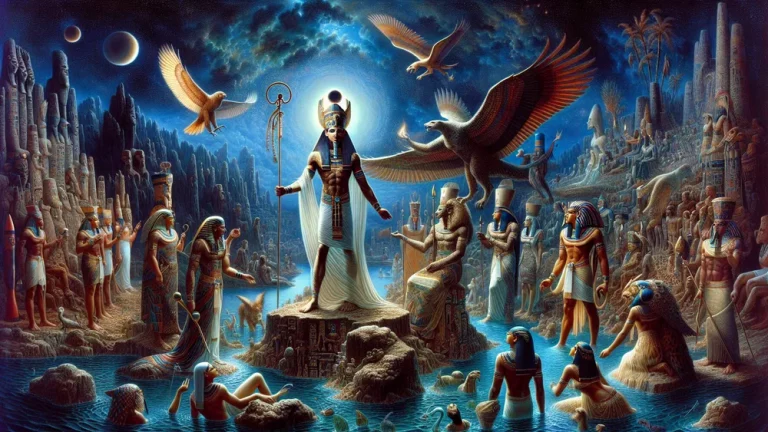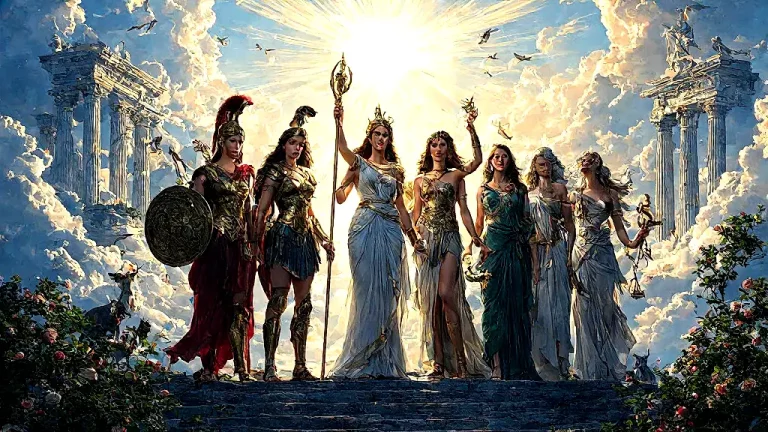The Most Famous Lovers In Greek Mythology And Their Tragic Tales
The love stories in Greek mythology aren’t just simple fairy tales. They’re complicated stories of passion, interference from the gods, and unavoidable disaster. These myths show how the Greeks saw love as powerful, but also dangerous. You’ve probably heard of Helen of Troy or Cupid, but each legend has different versions. Eurydice’s death changes depending on whether you read Ovid or Virgil, and Aphrodite’s role in Helen’s story isn’t always the same.
Key Points:
- Orpheus loses Eurydice forever when he looks back too soon, proving love can’t beat fate.
- Paris and Helen’s romance starts the Trojan War because gods played with their lives.
- Pyramus and Thisbe die from misunderstandings, like an ancient Romeo and Juliet.
- Psyche faces impossible tasks to win back Eros, needing help from ants and gods.
- Some lovers become gods together, like Eros and Psyche, when love is strong enough.
- Love often ends badly in myths, either by godly tricks or human mistakes.
- A few stories, like Alcestis and Admetus, prove love can be worth dying for.
These myths are like Romeo and Juliet, but darker. They’ve lasted for centuries. Next, we’ll explore what happened to lovers like Orpheus and Eurydice, who failed at the worst moment, and Paris and Helen, whose love started a war. Psyche even climbed Mount Olympus for love. These aren’t just old tales.
They’re windows into a world where gods controlled human lives, and fate always won in the end.
The Most Famous Lovers In Greek Mythology: Overview and Key Facts
| Couple | Key Mythological Story | Tragic Flaw or Theme | Primary Sources (with Variations) |
|---|---|---|---|
| Orpheus and Eurydice | Orpheus brings Eurydice back from Hades, but he loses her because he looks back too early. | Doubt vs. fate (moira) | Ovid’s Metamorphoses (Book 10), Virgil’s Georgics (Book 4) |
| Paris and Helen | Paris takes Helen, starting the Trojan War after Aphrodite’s promise. | The gods tricked them (ate) | Homer’s Iliad (Book 3), Cypria Fragment 1 |
| Pyramus and Thisbe | They were kept apart. When they thought the other was dead, they killed themselves. | Miscommunication | Ovid’s Metamorphoses (Book 4) |
| Eros and Psyche | Psyche had to finish impossible tasks before she could reunite with Eros. | Testing trust | Apuleius’ Metamorphoses (Book 4–6) |
| Hero and Leander | Leander drowns swimming to see Hero, and she jumps after him. | Ignoring warnings | Musaeus’ Hero and Leander |
- Orpheus’ doubt ruins his chance to save Eurydice.
- Moira means unavoidable fate – more rigid than what we call “destiny” today.
- Aphrodite had already promised Helen to Paris, which started the war.
- Ate refers to the gods making humans act recklessly (e.g., Iliad 19.91).
- Their story later inspired Romeo and Juliet.
- Psyche’s tasks were as hard as Hercules’ labors, but for love.
- The Hellespont (now Dardanelles) was a real and dangerous strait.
Orpheus and Eurydice: A Story of Heartbreak
Not many myths show the pain of lost love as clearly as Orpheus trying to get Eurydice back. This story proves that even the strongest love can’t change what fate has decided.
Orpheus’ Journey to the Underworld
Orpheus’ trip to bring Eurydice back is one of the most memorable underworld journeys in mythology. According to Ovid’s Metamorphoses (Book 10), his music was so powerful it made Hades’ court listen. Even the dead cried, Sisyphus stopped pushing his boulder, and Persephone helped. However, Virgil’s Georgics (Book 4) explains the harsh rule: Eurydice could only leave if Orpheus didn’t look back until they reached the surface.
It was an impossible test with no second chances. Key moments in Orpheus’ attempt and failure:
- The Performance: He sang about Apollo loving Hyacinthus (Met. 10.162–219), which showed his own sadness.
- The Bargain: Hades agreed, but only as a temporary agreement (Georgics 4.487–498).
- The Mistake: When Orpheus doubted at the last moment and looked back, Eurydice disappeared forever (Met. 10.57–63).
This story shows more than love. It reveals how the gods could be unfair. Hades said yes, but with hidden rules, and Orpheus’ human weakness – his need to be sure – made him lose everything.
Orpheus lost Eurydice forever because he couldn’t resist looking back, proving even the gods’ gifts come with cruel conditions.
Signs That Fate Can’t Be Changed
The myth clearly shows its tragic outcome through three obvious signs. These warnings would have been immediately understood by ancient audiences, just as we recognize clear danger signals today.

First, the snake that kills Eurydice (Metamorphoses 10.8-10) wasn’t just any animal. This creature represented unavoidable death, appearing right at their wedding. Second, Orpheus’ broken lyre after his failure contrasts with Apollo’s perfect instrument in the Homeric Hymn to Hermes (51-54). The damaged music reflected his doomed future. Finally, the entrance to Hades itself (Theogony 767-769) marked the point where divine rules became permanent:
- The Snake: Not just what killed Eurydice, but a warning about their love’s fate
- The Broken Lyre: Godly music ruined by human uncertainty
- Hades’ Entrance: Where the gods’ decisions became final
These weren’t hidden messages but obvious proof that certain forces – whether called fate, necessity, or the gods’ will – cannot be overcome.
Trying to Cheat Death
The Greeks knew death couldn’t be avoided, yet their myths show many attempts to escape it. Some worked, like Alcestis getting a short return to life in Euripides’ play, while others failed completely, like Orpheus.
Hesiod’s Works and Days (90-105) describes moira as the unbreakable rules of the universe, where even gods rarely interfere with death – which explains why Hades is called “most hated of gods” in the Iliad (3.278), since he never makes exceptions.
What separates these outcomes comes down to the conditions:
- Alcestis: A special deal from Apollo with a set time limit
- Orpheus: An agreement with hidden rules that couldn’t be broken
- Hades’ Role: Not evil, but the god who enforces the rules of life and death
These stories all show the same truth: while death might be delayed, it can never be avoided completely. The Fates’ decision is always final.
Paris and Helen: The Couple Who Started a War
While Orpheus’ love story ended in personal tragedy, Paris and Helen’s relationship caused a war that changed the ancient world. This showed how in Greek myths, love could lead to much bigger consequences than just personal suffering.
How Their Love Destroyed Troy
The fall of Troy resulted from a series of events caused by gods and human actions. Aphrodite’s promise in the Cypria Fragment 1 acted as a binding agreement that gave Helen to Paris, starting conflicts even the gods couldn’t stop. In the Iliad (3.121-447), Homer shows Helen wasn’t just a prisoner but someone caught between duty and desire.
She made tapestries that showed the war she helped cause – similar to seeing your own mistakes constantly displayed.
The destruction happened through three key moments:
- Divine Promise: Aphrodite’s oath that ignored human choice
- The Final Mistake: Paris taking Helen, which broke sacred guest-friendship rules
- Last Defense Gone: Achilles‘ death (mentioned in Proclus’ Chrestomathy) leaving Troy unprotected
The results of Paris’ decision lasted longer than anyone involved. The Trojan Horse simply ended what Aphrodite began years earlier. Even versions claiming Helen never went to Troy (like Stesichorus’ Palinode) couldn’t change the war’s reality. When gods set fate in motion, humans could only watch the events unfold without stopping them.
Gods Playing with Lives
The real planners of the Trojan War lived on Olympus, not in Troy or Greece. Eris‘ golden apple (Bibliotheca Epitome E.3.2) became an object that started major conflict by making gods compete fiercely. Hera’s actions in Trojan Women showed planned destruction, as she made Troy’s walls become proof of her revenge against Paris. Meanwhile, Athena in the Iliad (5.734-742) directly helped Greek warriors by guiding their weapons and weakening Trojan soldiers.
The gods did more than watch – they controlled events in a game where they decided outcomes:
- The Apple: Started the conflict by making gods compete
- Hera’s Anger: Caused complete breakdown of Troy’s defenses
- Athena’s Help: Gave Greeks advantages in battle
A Trojan soldier might see arrows suddenly change direction or allies panic without reason. This showed how gods affected the war daily. The “Judgment of Paris” story proves how Greek gods worked: one man’s decision could destroy a city when gods wanted revenge.

The gods caused the Trojan War by making gods fight over an apple, breaking Troy’s walls in revenge, and helping Greeks win battles.
Pyramus and Thisbe: Rome’s Doomed Sweethearts
While gods affected entire countries through Paris and Helen’s story, Ovid’s book Metamorphoses tells a more personal sad story. It describes two Babylonian lovers whose relationship ended in a similar tragic end. This showed that in ancient myths, love could be dangerous for both nations and single people.
A Love That Ended in Blood
The crack in the wall between their houses, which Ovid describes in detail in Metamorphoses (4.55-166), was more than just a wall. It represented a Roman burial boundary symbol that separated life from death before the lovers died. After Pyramus discovered Thisbe’s bloodstained veil, Virgil’s Eclogues says white mulberries turned dark red as the berries changed color from their blood.

This became what we now call one of history’s most famous tragic scenes.
Their double suicide, which Seneca discusses in Epistles 12.10 as their unavoidable fate, showed how Romans viewed love’s power. Three elements made this story significant:
- The Wall: Both connected and divided them, much like modern long-distance relationships
- The Mulberry: Became a natural monument to their deaths
- The Suicides: Represented the ultimate sacrificial promise in Roman culture
Romans hearing this story would understand Pyramus biting his sword differently, since their culture valued dying with honor. The changed berries proved that strong love could affect the physical world. Even the wall’s crack, which first let them talk, ultimately led to their deaths – showing how good and bad outcomes often come from the same source in myths.
How Their Story Lives On
Pyramus and Thisbe’s sad story spread beyond Babylon to become important in many cultures. The table shows how different ancient works kept their story alive:
| Source | Object | Meaning |
|---|---|---|
| Ovid’s Metamorphoses | The cracked wall | Forbidden love that breaks through obstacles |
| Athenian grave markers (CEG 13) | Clasped hands | Lovers separated forever by death |
Even today we can find their legacy. The wall with a crack in Ovid’s story inspired later balcony scenes in literature. Those Athenian grave markers show how their story related to common feelings about love and grief. What’s interesting isn’t just that the legend survived, but that its main parts stayed the same whether people carved them in stone or wrote about them in poems.
Eros and Psyche: Love Against All Odds
The story of Pyramus and Thisbe ended tragically, but another ancient myth demonstrates how even gods could be affected by love. The tale of Eros and Psyche involved difficult challenges that would push both divine beings and humans to their limits.
Psyche’s Impossible Challenges
Venus gave Psyche four tasks in Apuleius’ Metamorphoses (Book 6) that were so hard they seemed impossible. The first challenge was sorting a huge pile of mixed grains overnight, which would overwhelm anyone. However, the story takes an interesting turn when ants came to help, similar to Aesop’s Fable 112 where ants show surprising intelligence.
This shows how ancient tales often have help coming from unexpected places. The final and most dangerous task was getting water from the River Styx, which Hesiod describes in Theogony 775-806 as water used for gods’ unbreakable promises. This required divine intervention, with Zeus sending his eagle because no human could do it alone.
Here are Psyche’s four main challenges:
- Grain Sorting: Tiny insects solving an enormous task
- Golden Fleece: Facing violent rams which were extremely dangerous
- Styx Water: Needing a god’s help to survive
- Underworld Journey: Meeting Persephone without divine protection
Venus chose these trials carefully to test human weaknesses while representing cleansing ceremonies. The grain separation stood for careful choice, while the Styx water meant solemn promises. Psyche succeeded through both her own efforts and help from gods, showing how ancient people believed impossible challenges could be overcome with human effort and divine aid.
The ants‘ help is especially notable – in a story about a god loving a human, it’s important that the first helpers were hardworking earthly creatures connecting animals and gods.
Becoming Gods Together
Psyche’s challenges led to something few humans achieved – she became a goddess, similar to how Heracles became a god (Apollodorus 2.8.1).
While Plato later wrote about the soul reaching divine status in Phaedrus (246a-257b), the actual myth shows Psyche drinking ambrosia to gain immortality, getting honors from the gods, and having a child named Pleasure (Voluptas) – a meaningful name for their child.
Here’s what this transformation involved:
- Divine Nectar: Drinking the liquid that makes gods immortal
- Olympian Recognition: Zeus officially approving their marriage
- God and Human United: Eros (Love) and Psyche (Soul) joined forever
- Philosophical Connection: Plato’s ideas appearing in myth form
This wasn’t simply a good ending. Like with Heracles, Psyche’s extreme suffering led to becoming divine, showing how Greeks believed exceptional humans could reach godhood. The wedding feast on Olympus (described by Apuleius) marks when Psyche – whose name means both “soul” and “butterfly” in Greek – changes from mortal to immortal.
This completes a unique love story where deep devotion resulted in creating new gods.
Other Tragic Couples You Might Not Know
Eros and Psyche became gods in their story, but Greek mythology has many forgotten love stories that ended badly. These other tragic couples aren’t as famous as more well-known pairs, but their emotional tales show all the ways love worked in old myths.
What Greek Myths Teach Us About Love
These old Greek love tales are more than just exciting stories. They show us how strong love can be, including both its god-like and human aspects. When we look at these myths together, we can find important lessons about love that still matter today.
Love as a Curse
In Greek mythology, love sometimes became dangerous when humans angered the gods. One example comes from Euripides’ Hippolytus (1-57), where Aphrodite punished a hunter for ignoring her worship. Poseidon then killed him with a bull, showing what happened when someone rejected love. Another story in the Homeric Hymn to Aphrodite (5.218-238) tells how Eos, the dawn goddess, accidentally killed her lover Orion after Apollo tricked her.
These myths show love’s dark side through:
- Divine Wrath: Aphrodite’s anger at Hippolytus for preferring Artemis
- Deadly Mistakes: Eos unknowingly causing Orion’s death
- Mortal Danger: Why relationships with gods often ended badly for humans
Unlike modern stories where love turns scary through obsession, these Greek tales involved real magic and gods. What makes them unique is how personal choices affected the whole world – Hippolytus’ decision upset the gods’ balance, while Eos’ love directly caused Orion’s death.
The clear lesson is that in these myths, love from gods could be as much a punishment as a gift.
Greek myths tell how love from gods often brought harm when humans made choices that angered them.
Love Worth Dying For
Greek mythology shows love’s greatest challenge in two special stories. In Euripides’ play, Alcestis chose to die so her husband Admetus could live – the only myth where a wife makes this choice, which was very different from usual tales of gods controlling human lives. Similarly, in the Iliad (18.22-38), Achilles abandoned his quest for glory to avenge Patroclus, showing deep love was more important than honor to this famous warrior.
These stories prove:
- Self-Sacrifice: Alcestis drinking poison to save her husband
- Changed Priorities: Achilles risking death for revenge
- Love’s Power: Both breaking normal rules for love
Alcestis’ act would be like someone today giving their heart to save a partner – complete and final. Achilles’ story is harder, since his famous anger turned from war to personal revenge, showing even heroes could be changed by love.
What makes these special is how love overcame basic human needs – Alcestis left her children, and Achilles knew he would die. The myths treat these not as mistakes, but as proof of love’s strength in Greek culture.
When Love Leads to Ruin
Greek mythology often shows how love can destroy lives. The story of Helen in the Iliad (3.173-175) tells how Aphrodite confused her thoughts, making her leave Sparta for Paris and start the Trojan War. Another example is Phaedra in Euripides’ play, whose forbidden love for her stepson Hippolytus led to lies and deaths.
Later, Stoic thinkers like Epictetus (Discourses 3.24) used these stories to warn about dangerous emotions.
These examples teach us:

- Divine Deception: How gods could cloud human judgment
- Forbidden Passion: Why wrong desires often end badly
- Philosopher’s Advice: Why controlling emotions matters
Helen’s story is like someone today ruining their life for love, but with much bigger consequences. Phaedra knew her feelings were wrong but couldn’t stop herself, similar to modern addiction stories. The Stoics saw these myths as lessons about self-control rather than just tales.
What makes these stories Greek is how they mix godly influence with human choice – Helen was tricked but still faced results, while Phaedra’s own weakness destroyed her without gods involved.
FAQs
Why are tragic endings common in Greek love myths?
Tragic endings are common in Greek love myths because they underscore the inevitability of fate (moira) and the gods’ capricious interference in mortal lives.
How did these myths shape Roman literature?
These myths shaped Roman literature through direct adaptations like Ovid’s “Metamorphoses” and Seneca’s tragedies, which reinterpreted Greek tales for Roman audiences.
Which couple best represents forbidden love?
The couple that best represents forbidden love is Pyramus and Thisbe, whose tragic separation by societal barriers epitomizes the theme in Ovid’s Metamorphoses.
Are there myths where love triumphs over fate?
Myths where love triumphs over fate include Baucis and Philemon’s divine reward and Odysseus and Penelope’s enduring reunion.








